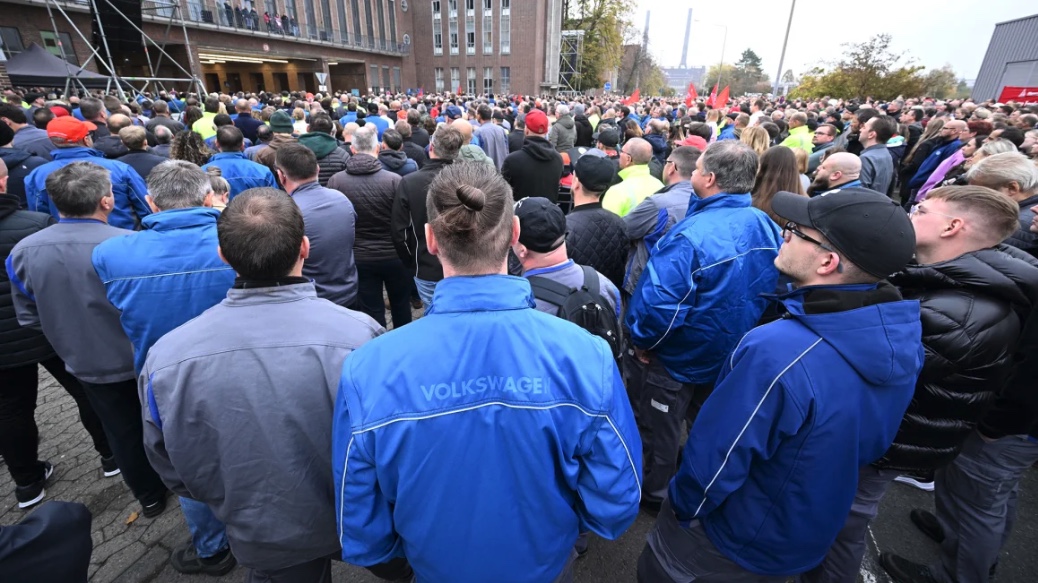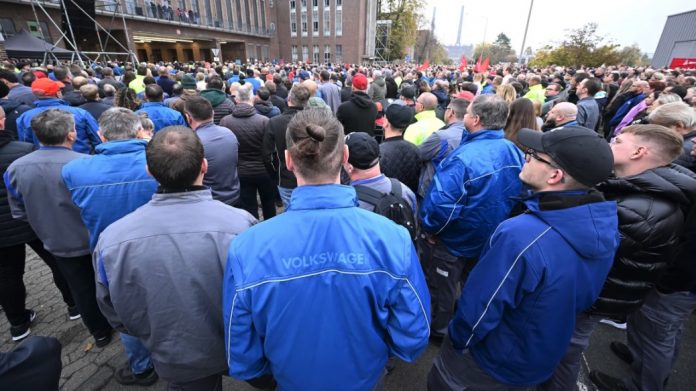Volkswagen ประกาศแผนปิดโรงงานในเยอรมนีอย่างน้อย 3 แห่ง รวมถึงการเลย์ออฟพนักงานหลายหมื่นคนและปรับขนาดโรงงานที่เหลือในประเทศ ซึ่งเป็นการตัดสินใจที่เกิดขึ้นภายใต้แรงกดดันจากความท้าทายต่าง ๆ ในฐานะผู้ผลิตรถยนต์ที่ใหญ่ที่สุดของเยอรมนี โดยแผนการปิดโรงงานนี้ถือเป็นครั้งแรกในประวัติศาสตร์ 87 ปีของบริษัท ข้อมูลดังกล่าวถูกเปิดเผยจากกลุ่มพนักงานของ Volkswagen เมื่อวันจันทร์ที่ผ่านมา
การปิดโรงงานในเยอรมนีสร้างความกังวลในหมู่สหภาพแรงงาน เนื่องจาก Volkswagen มีพนักงานเกือบ 295,000 คนในประเทศ และอาจส่งผลให้เกิดการนัดหยุดงานในสัปดาห์ที่จะถึงนี้ ซึ่งมีกระแสการต่อต้านที่เพิ่มขึ้นอย่างชัดเจน ในขณะที่บริษัทอยู่ระหว่างการเจรจากับสหภาพแรงงานเกี่ยวกับแผนการลดต้นทุนและปรับโครงสร้างการดำเนินงาน
Thorsten Groeger หัวหน้าผู้เจรจากับสหภาพแรงงาน IG Metall กล่าวในแถลงการณ์ว่า “หาก Volkswagen ยืนยันที่จะดำเนินตามเส้นทางที่น่าเศร้าในวันพุธ คณะกรรมการจะต้องเตรียมรับมือกับผลที่ตามมา” โดยการนัดหยุดงานจะเป็นไปได้เฉพาะตั้งแต่วันที่ 1 ธันวาคมเป็นต้นไป ตามข้อตกลงระหว่างสหภาพและ Volkswagen ซึ่ง IG Metall ยังบอกด้วยว่า “พนักงานหลายหมื่นคน” พร้อมที่จะ “แสดงความไม่พอใจต่อการบริหารจัดการ”
ในการแถลงการณ์ของคณะกรรมการการทำงานของ Volkswagen ซึ่งเป็นตัวแทนพนักงานและถือครองที่นั่งครึ่งหนึ่งในคณะกรรมการบริษัท กล่าวว่า การลดจำนวนพนักงานในครั้งนี้ รวมถึงการลดเงินเดือนพนักงานทุกคน 10% ถือว่าลึกซึ้งกว่าที่คาดการณ์ไว้และ “อยู่ในระดับประวัติศาสตร์”
“โรงงาน Volkswagen ทั้งหมดในเยอรมนีได้รับผลกระทบจากเรื่องนี้ ไม่มีโรงงานไหนปลอดภัย” Daniela Cavallo ประธานคณะกรรมการการทำงานกล่าว พร้อมระบุว่า Volkswagen วางแผนที่จะย้ายการผลิตบางส่วนไปต่างประเทศหรือจ้างงานจากบริษัทอื่น และเตือนพนักงานไม่ให้มองว่าข้อเสนอของบริษัทเป็นเพียงกลยุทธ์ในการเจรจา
“นี่คือแผนการของกลุ่มอุตสาหกรรมที่ใหญ่ที่สุดของเยอรมนีในการเริ่มต้นการขายกิจการในประเทศบ้านเกิด” Cavallo กล่าว
Volkswagen ซึ่งเป็นหนึ่งในผู้ผลิตรถยนต์ที่ใหญ่ที่สุดในโลก เตือนว่าต้องการการปรับโครงสร้างอย่างรุนแรง เนื่องจากเผชิญการแข่งขันที่เพิ่มขึ้นจากจีนและยอดขายที่ชะลอตัวในตลาดอื่น ๆ ตามข้อมูลจากผู้บริหาร บริษัทขายรถยนต์ในยุโรปลดลง 500,000 คันต่อปีเมื่อเปรียบเทียบกับระดับก่อนเกิดโรคระบาด ซึ่งเท่ากับประมาณสองโรงงานผลิตรถ
Volkswagen ย้ำในแถลงการณ์ว่า “สถานการณ์นี้ร้ายแรง” Gunnar Kilian สมาชิกคณะกรรมการฝ่ายทรัพยากรบุคคลกล่าว “หากไม่มีมาตรการอย่างครอบคลุมเพื่อฟื้นคืนความสามารถในการแข่งขัน เราจะไม่สามารถทำการลงทุนในอนาคตที่จำเป็นได้”
Thomas Schaefer ซีอีโอของ Volkswagen ในกลุ่มรถยนต์นั่ง กล่าวว่า โรงงานในเยอรมนีไม่สามารถสร้างผลผลิตได้ตามที่คาดหวัง และต้นทุนการผลิตสูงกว่าที่บริษัทวางแผนไว้ถึง 50% ทำให้ต้นทุนของแต่ละโรงงานสูงกว่าคู่แข่งถึงสองเท่า
“นอกจากนี้ เรายังมีการจัดการหลายอย่างภายในที่คู่แข่งได้จ้างบริษัทอื่นทำอย่างมีประสิทธิภาพในด้านต้นทุน” เขากล่าว
Volkswagen กล่าวว่า ต้นทุนแรงงานก็ “สูงเกินไปอย่างมีนัยสำคัญ” และจะมีการเสนอ “ข้อเสนอที่เป็นรูปธรรม” เพื่อลดต้นทุนเหล่านี้เมื่อเริ่มการเจรจากับสหภาพแรงงานอีกครั้งในวันพุธ
บริษัทไม่ตอบสนองต่อคำขอจาก CNN เพื่อขอรายละเอียดเกี่ยวกับการปิดโรงงานและการเลย์ออฟพนักงาน โดยก่อนหน้านี้ บริษัทได้กล่าวว่าจะพยายามยกเลิกข้อตกลงการคุ้มครองการจ้างงานกับสหภาพแรงงานซึ่งมีผลตั้งแต่ปี 1994 เพื่อ “สร้างความมั่นคงในอนาคต” ให้กับธุรกิจ
Historic moment for Volkswagen: Automaker plans to close ‘at least’ 3 German plants and cut thousands of jobs

Volkswagen plans to close “at least” three factories in Germany, lay off tens of thousands of staff and downsize remaining plants in the country, the company’s employee group said Monday.
The domestic factory closures would be the first in Volkswagen’s 87-year history, and they lay bare the challenges facing Germany’s largest manufacturer. The plans are already facing pushback from labor unions in the country, where Volkswagen employs 295,000 people, setting the stage for possible strikes in the coming weeks.
Volkswagen has been locked in negotiations with unions for weeks over its plans to cut costs and restructure business operations.
“If VW confirms its dystopian path on Wednesday, the board must expect the corresponding consequences on our part,” Thorsten Groeger, lead negotiator for one of Germany’s most powerful unions, IG Metall said in a statement Monday.
While a potential strike is only possible starting December 1, in terms of an agreement between the union and Volkswagen, IG Metall told CNN that “tens of thousands” of workers are “ready to express their dissatisfaction with management.”
In its statement Monday, Volkswagen’s works council, which represents employees and holds half the seats on the company’s board, said that the planned cuts — which include slashing all workers’ pay by 10% — were deeper than expected and “of historic dimensions.”
“All German VW plants are affected by this. None of them are safe,” works council chairperson Daniela Cavallo added. She said that Volkswagen planned to move some production abroad or outsource it to other companies and warned workers against dismissing its proposals as simply a negotiating tactic.
“This is the plan of Germany’s largest industrial group to start the sell-off in its home country,” Cavallo noted.
Volkswagen, one of the world’s biggest carmakers, has warned that it needs a radical overhaul as the group faces growing competition in China and slowing sales elsewhere. According to executives, the automaker is selling 500,000 fewer cars in Europe a year compared with pre-pandemic levels, the equivalent of around two car plants.
Volkswagen reiterated these sentiments in a statement Monday. “The fact is: the situation is serious,” human resources board member Gunnar Kilian said. “Without comprehensive measures to regain competitiveness, we will not be able to afford essential future investments.”
People pose and take photos with the new Mona M03 electric vehicle by Chinese EV manufacturer XPeng, during its launch in Beijing on August 27, 2024.
Thomas Schaefer, the CEO of Volkswagen passenger cars, added that its German factories were not productive enough and that plant costs were as much as 50% above what the company had budgeted for, making individual plants twice as expensive as the competition.
“In addition, we at Volkswagen still handle many tasks internally that the competition has already outsourced more cost-effectively,” he said.
Labor costs were also “significantly too high,” Volkswagen said, adding that it would make “concrete proposals” for reducing these when it resumes talks with labor unions on Wednesday.
The company did not respond to a CNN request seeking clarity on the factory closures and job cuts. It has previously said that it would seek to terminate an employment protection agreement with labor unions, which has been in place since 1994, to “future proof” the business.
By Hanna Ziady, CNN

















